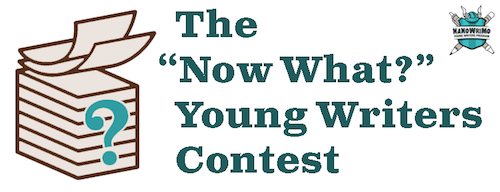Chris Baty's Blog, page 83
March 22, 2019
Read the YWP "Now What?" Contest Grand Prize Winner (14-18 Division)!

Last month, we challenged our young writers (18 and under) to revise and submit a 400-word excerpt from their NaNoWriMo novel. From over 650 stupendous entries, we chose two Grand Prize Winners and three Honorable Mentions. We hope you enjoy reading them as much as we did!
Splintered by Ben — Grand Prize Winner (14-18 Division)“Do come inside.”
Leonard stepped into the room.
The room looked like an office belonging to someone rather important, the kind where the person sits facing the door behind a desk and waits for people to come inside so they can tell them to sit.
The woman sitting behind this particular expensive desk was strong-shouldered, dark-skinned, and wearing a crisp grey suit with a red tie. Her hair was in dreadlocks, pulled back in a ponytail, and she wore reflective sunglasses. She carried herself confidently, with the smile of one who had complete control. Leonard had worn that smile before, but he wasn’t wearing it now. Something about her struck Leonard as familiar, but he couldn’t place it.
She laced her fingers together and rested her hands on the table. “Good evening, Mr. Patel. Oh, but—is Kumar Patel your real name?” She smiled knowingly.
Leonard forced his voice calm. “Of course it is. Why wouldn’t it be?”
“Hmm. Well, Mr. Patel, you’ll be surprised to know we don’t have you on any lists here.”
“Maybe it’s a glitch? A misfiling?” Leonard suggested weakly. “I don’t know. I’m just trying to do my job.”
“Hmmm. Well. You’ll have to forgive me for this. We must take all necessary security measures, you understand.”
“Right,” Leonard nodded, but his eyes were focused on the nameplate on the desk. Grand Master Vesta O. Ellsworth, it read. He swallowed. He knew that name.
“My eyes are up here,” Vesta said with a hint of amusement.
“I wasn’t—but you’re wearing sunglasses.” Leonard’s eyes darted up to meet his doubled reflections.
Vesta’s smile split into a perfect white grin. Predatory. “Oh, are they a problem? Then let me just take them off.” She reached up and pulled away the glasses.
She opened her eyes. Leonard inhaled slightly.
The Grand Master of the Illuminati Society did not have what one could possibly call normal eyes. The irises had the precise color and reflectiveness as the sunglasses she had worn. Silver, mirror-like, and peculiarly captivating.
“That’s…” Leonard was at a loss for words.
“Different? Unusual?” Vesta suggested. “Mm, yes. But let’s not worry about that. You’re from another faction, aren’t you?”
“I don’t…” Leonard trailed off, his thoughts drifting into nonexistence. “What are you…?”
Vesta leaned across the desk, staring intently at Leonard. She didn’t blink. “Let’s try that again. What is your real name?”

Ben is a teenage writer and thing-creator. He’s fond of sharp suits, birds, and science. Ben is not his legal name, but it’s one he likes. He has a lot of names. Others have described him as a cryptid, a chunk of the Void wearing a suit, a Teeth People, and a snake (in a good way). Ben cannot legally deny these claims. He dreams of being an eccentric man who lives with a lot of books and a lot of birds.
March 20, 2019
6 Ways You Can Overcome Writer’s Block Right Now

Here at NaNoWriMo HQ, we’re gearing up to start our next Camp NaNoWriMo event in April. If you haven’t written anything in a while, this is a great excuse to jump back into the habit! Today, writer and blogger Joel Syder is here with a few tips to help you overcome writer’s block if you’re feeling stuck:
As a writer, it’s inevitable that sooner or later you’re going to come up against what is known as writer’s block. As a writer myself, I went two years without coming across this taboo concept, but alas, one day I awoke and found myself staring at a blank word document with absolutely no ideas or any clue on what to say.
This drought lasted months. Of course, I was able to complete client work or other projects where I had guidance or templates to work with, but when it came to my personal writing, I just couldn’t seem to put pen to paper.
After trying basically everything I could, after advice from writer friends to online advice, I found several ways to help overcome it. Some worked. Some didn’t. Today, we’re going to explore some of the more successful methods, helping you to overcome your writer’s block.
1. Have a schedule.When I started out, I used to write whenever I wanted at all hours of the day. It was typically when inspiration struck. However, this developed the bad habit of becoming increasingly undisciplined and without focus.
“By developing myself a writing schedule, all the ideas would flood to me throughout the day (which I would only make a note of), but then when I sat down to write, I had focus and my mind knew it was time to get words down on paper,” shares Tina Hardy, a book editor for WriteMYX and Brit Student.
2. Don’t beat yourself up.Suffering from writer’s block can be demoralizing, and it’s easy to think there’s something wrong with you, or you should be doing better than this. Nevertheless, the harder you are on yourself, the worse the writer’s block will be.
Go easy on yourself. As I said before, my writer’s block lasted for months, and it was easy to think it was all my fault. However, the more I relaxed, the easier writing became.
3. Pressure creates diamonds.Although some of us avoid stress and worry like the plague, having a bit of pressure to perform can bring out the best in us; just like coal can turn to diamonds, if you’re into that metaphor. Set yourself a deadline with your writing and work hard to meet it. Punish yourself with less TV time or reward yourself with a nice meal for meeting it.
“If you’re writing a new chapter or blog post, give yourself a set date that you want to complete it by, and then work out how many hours it will take, and then combine this with your schedule, so you know exactly what you’re going to write and when,” explains Terry James, a publicist for 1Day2Write and Next Coursework.
4. Juggle tasks.Now, I’m not saying multitasking in a good idea. It lessens our focus on the tasks we’re doing, thus harming the overall quality of the piece. However, what you can do instead is focus on tasks, but juggle multiple tasks to keep your mind fresh.
Write up a draft for one task, then another, then another. Then go back to the first and keep cycling through like this. This will keep your mind fresh, and you’ll be much less likely to have writer’s block on any of your projects.
5. Let sleep be your friend.When we sleep, our mind is actively solving problems and coming up with solutions, and this works very well for writing. Spend 15-30 minutes before you go to bed focusing on your writing, whether you’re rereading something you’ve already written, or simply jotting down notes.
When you wake up in the morning, you’ll be full of ideas on how to proceed. I found this to be one of the best ways to come up with new inspiration for my content.
6. Use technology to aid you.Thanks to modern-day technology, there are a ton of apps and services out there that can help you overcome writer’s block. From providing you with writing prompts, to actively helping you manage your schedule, it can pay to research what’s out there to see what’s best for you.
One of my firm favorites is The Dangerous Writing App. This is a distraction-free writing website that deletes everything you’ve written if you stop writing for ten seconds over the course of three minutes. Start with an idea and then force yourself to write for this long. Read it back to get the creative juices flowing!

Joel Syder is a writer and blogger at Originwritings.com and Academicbrits.com. He enjoys helping people to write the book they’ve been dreaming of, as well as creating articles about things that excite him for PhD Kingdom, academic service.
Top photo by Brad Neathery on Unsplash
March 18, 2019
6 Reasons You Should Participate in Camp NaNoWriMo (Even If You’re Not a Writer)

Camp NaNoWriMo
is happening soon! Today, we have the pleasure of reposting this article from
blogger Rebekah Joan
about reasons to
participate in Camp, even if writing isn’t your jam
:
Every April and July, writers from across the globe participate in Camp NaNoWriMo. They pick up their pens (or open up their laptops) and go on an adventure-filled journey.
Camp NaNoWriMo is a writing competition (against yourself + time). No one gets first place, but if you hit your word count, you “win.” You have an entire month (either April or July) to write your way to the end of your story.
With Camp NaNoWriMo right around the corner, writers are gearing up with plots, outlines, character sheets, and all the motivation they can find.
But what’s the point? And why should you participate in Camp NaNoWriMo—even if you aren’t a writer?
1. You get prizes.That’s right. Even if you don’t win, you can get some sweet deals on writing software, etc. from the Camp NaNoWriMo sponsors. While Camp NaNoWriMo doesn’t have quite so many offers as the November event, there’s still plenty to keep you motivated.
2. You get to join a community.When you participate in Camp NaNoWriMo, you’re put into a cabin with a handful of other writers. It makes for a great support group. You can share writing prompts, encourage each other, and make some new friends along the way.
If you’re looking for a cabin full of enthusiastic writers, you can search on the “Finding Cabin Mates” forum. Cabins can hold up to 20 people!
This article here explains the details of joining a Camp NaNoWriMo cabin.
3. Camp NaNoWriMo forces you to set a routine.If there’s one thing writers have learned from NaNoWriMo, it’s that you can’t win unless you set aside time to write. There are plenty of ways to make time to write, like getting up early in the morning, writing in the in-between times of your day, or actually scheduling time for it.
You have to find what works for you.
Setting a routine in your day will help you to boost your productivity. Everyone needs a bit of structure in their life, and Camp NaNoWriMo is a great place to get it from. Whenever I give myself structure in my day, I get way more done, I’m happier with myself, and I feel way more satisfied about how my day went.
4. You can boost your creativity.Some people hate writing. Absolutely, totally despise it. And you know what? I used to be the same way too—until I tried my hand at creative writing. Now I love it in every form! You just have to get past what school taught you to hate. Writing (or any creative process, really) is a great way to explore your imagination, de-stress, and learn things about yourself that you didn’t know.
And for those afraid of Writer’s Block, there are plenty of ways to get rid of it:
Having an outline will give you a clear path on what to write.The Amazing Story Generator will give you endless (and fun) prompts + ideas.Skipping to a different scene can get your brain moving.A change of scenery can help boost productivity + clear your mind of cobwebs.5. You can get excited about something.When was the last time you got excited about something? Like, REALLY excited? Starting your own writing project will give you bursts of inspiration, giddy thoughts about creating backstories, and tons of excitement. Plus, you get to be a part of a community of thriving writers.
Now that’s something to get excited about.
6. You get to set your own goal.Here’s the thing:
NaNoWriMo has very few rules, but the most important one is that you write 50K words in 30 days.
Camp NaNoWriMo is different.
Instead of having a terrifyingly high target word count assigned to you, you get to choose your own. As I’m working on this blog + freelance writing + starting married life, I set mine at 20,000 words. That’s less than 1,000 a day. Anyone can do that. You can do that.
So what do you say?
Are you ready to jump on in and join Camp NaNoWriMo this time around?

Rebekah Joan is a lifestyle and travel blogger. She’s also a fiction writer, a photographer, a NaNoWriMo fanatic, a pizza lover, and a freelance writer. You can follow her blog at www.rebekah-joan.com.
March 15, 2019
Camp 101: The Basics for First-Time Campers
 What in the world is Camp NaNoWriMo?
What in the world is Camp NaNoWriMo?Camp NaNoWriMo is a bi-annual online writers’ retreat that takes place in April and July. Camp gives you the opportunity to set your own goals and work on any writing project in a supportive environment with lots of writers’ resources. Camp is a great time to test run any writing project, whether it be a novel, comic book, graphic novel, memoir, screenplay, travel guide, cookbook, thesis, epic poem, one-act play, or anything else you can dream up!
Campers from all around the world come together online (and often in person) to share their daily progress, and cheer each other on! No matter what project you choose to work on, no matter what stage of progress you’re in, your fellow campers will be able offer some useful advice and encouragement along the way! The best part is that Camp is fun and free to all! And you never know who you will meet—maybe even the protagonist of your new novel.
How do I do Camp?It’s OK to feel nervous and excited. Everyone feels that way on their first day of Camp. But, don’t worry. It’s super simple to get started. All you have to do is sign up, pick a cabin, and create your project! Piece of cake. You can do it! Don’t be shy. We are all in this together. And just in case you get lost out on the trail, here is a step by step guide to help you arrive at Camp safe and sound.
Create your profile so your fellow Campers can connect and cheer you on! (If you already have a NaNoWriMo profile, you can just sign in to the Camp NaNoWriMo website with your regular username and password.) Create your project as early as March (you can change it later). Give it a title and you’re good to go!Join a cabin with up to 20 fellow Campersto communicate and share encouragement during a Camp NaNoWriMo session. You are assigned to a cabin based on the preferences you select in “Cabin Settings.” Or create a private cabin and invite Campers with similar projects or interests. Snag some flair to show your Camp NaNo pride on your social media profiles and let others know that you’ll be participating. Get inspired with pep talks, blog posts, and events—plus, some sage advice from your Camp Counselors, published authors who volunteer to share their experience and offer support.Update your word count, or whichever method you choose to mark your daily progress on the Camp website and watch your project climb to the finish line! Claim your win by validating your project starting on April 20th and through the end of the month. There’s no cash prize, but you get bragging rights, special sponsor goody rewards, and your very own novel !)What are some tips?
If this all sounds pretty daunting, don’t worry—you’re not alone. Luckily, the NaNoWriMo community is full of writers happy to share their wisdom and tips for tackling Camp in style. Here’s a few tidbits of advice from last year’s #CampNaNoAdvice tweet chat:



March 13, 2019
Read, Write, and Know the Character

Camp NaNoWriMo is just around the corner! Now that March is here, we’re starting to think about gearing up for our next writing adventure. Today, NaNoWriMo participant Vrushali Khadilkar shares a few tips on creating strong characters, as well as a book recommendation:
When someone asks me about how a writer finds their own voice, I always say that you have to read books in order to understand the tone of the characters and voice. You have to understand the scenes and you have to get totally into it.
When you are not a traveler and can’t visit different places now and then, but you still want to explore new cultures, then you must get your hands on books. When you read books, you go miles away from the place you are. Once you understand this, you know how and what needs to be written down in order to create impact!
For a writer, it’s very important to understand the psychology of the characters you’re creating and how they will behave. Before getting on the journey to write, you should consider what genres you love to read and write about.
Challenge yourself to explore different genres. Get a hold of books from many genres and start reading! Notice which books you engage with and which books you never finish reading. Your habits and likes will change and make your writing style unique.
What’s important is that you have started reading. It doesn’t matter how early or how late.One of the books I’ve read that has helped me deeply engage with and understand the character’s motivation is John Green’s Turtles All the Way Down. It’s a young adult novel and I strongly encourage you to read it!
Just experience how well the author portrays the unique experience of being in this young girl’s mind:
“You remember your first love because they show you, prove to you, that you can love and be loved, that nothing in this world is deserved except for love, that love is both how you become a person and why.”
Even if you’re not a teenage girl in love, you can relate to the experience that she’s having in this book.
Why wait? Pick up a novel today to see what kind of character voices speak to you!

Vrushali Khadilkar is a commerce graduate and currently a freelancer. She writes on range of topics on her blog, which is turning20web.wordpress.com. Visit Instagram @april_autumn12 to find links to her podcasts and lots more.
Vrushali has been participating in NaNoWriMo since last year and it’s been an amazing experience. Thank you NaNoWriMo for providing this amazing platform!
Top photo by Raj Eiamworakul on Unsplash.
March 11, 2019
To Write or Not to Write: Is That the Question?

Camp NaNoWriMo is just around the corner! Now that March is here, we’re starting to think about gearing up for our next writing adventure. Today, NaNoWriMo participant K.A. Magrowski shares a few tips on determining whether you need to take a break from your manuscript, or if you should keep keep pushing through:
To be a successful writer (in whatever way you choose to define that) means writing even if you don’t want to. But is it okay sometimes not to write? Of course it is! Sometimes the answer is to do something else, like go for a run, or read, or even play a video game.
However, before you skip that writing session, you need to determine why you don’t feel like writing. Are you unsure of how to advance the plot? Are you feeling overwhelmed? Feeling like the story is not how you imagined it and you’re disappointed? Or is your head still filled with non-writing worries and anxieties from a bad day at work or other non-writing problems?
For me, it’s so easy to look at the amount of work needed and say, Oh I don’t feel passionate about this or I think this sucks, so I’m going to play World of Warcraft (yes, still playing). The road to procrastination is paved with side quests. The trick is being honest and saying either:
“I just can’t dredge up the words because my mind or body is overwhelmed. I need a break to do something else today.”
or…
“I’m at a tough spot and it’s going to be rough, but I’m going to focus on this story for one hour and see what happens.”
For the first option, getting out of your head for an hour or an evening may be the answer. Let your mind rest and do something physical or social. But for the second, the best thing to do is buckle down. Sometimes the hardest work, where I’m thinking deeply about my writing because I’m having trouble with the scene or the character, is the most fruitful. It’s also the toughest point to start writing because there’s that fear that I won’t be able to produce anything worthwhile and that I’m a fraud and a hack.
“The road to procrastination is paved with side quests.”This is when I have to dig deep. Can I do 30 minutes? 15 minutes? Can I write just one paragraph? I tell myself I can delete it when I’m done. These tricks (yes, somehow I can trick myself, which is pretty darn amazing. Brains are weird) of time and short bursts of writing lend a sense of impermanence to the writing, which may be what I need at the moment. After all, if I pretend it’s not “serious writing,” then there’s no pressure. I can delete it and move on. I’m often pleasantly surprised by what comes of letting go of the pressure to perform.
If all else fails, I switch tracks completely. Last week, feeling conflicted and overwhelmed about working on my projects, I let myself write a few poems. No one has to see them, I flexed some creative muscle, and also worked on brevity and imagery. A win all around.
At the end of the day, it helps to remember that 10 minutes of writing is better than nothing. You don’t have to create a masterpiece each session. Just write and let go for a few precious moments. You will be amazed at what will flow once you open the faucet just a bit with no expectations.

Gamer / Geek / Triathlete / Bibliophile / Cat Lady Extraordinaire, K.A. Magrowski hails from the haunted wilds of South Jersey, home of the Jersey Devil. Fueled by coffee and wine, she writes speculative fiction for children and adults and is the former president of the South Jersey Writers’ Group. Her short work has appeared in magazines, and various anthologies including Tall Tales and Short Stories from South Jersey, Reading Glasses, We Walk Invisible, She Blended Me With Science, as well as online.
Top photo by Humphrey Muleba on Unsplash.
March 8, 2019
Fake It ‘Til You Make It: Finding the Time to Write (Even When You Don’t Have Any to Spare)

Camp NaNoWriMo is just around the corner! Now that March is here, we’re starting to think about gearing up for our next writing adventure. Today, NaNoWriMo participant Juliana Xavier shares a few tips on setting realistic goals and making time even if you don’t have any to spare:
Dear Wrimos,
Let’s start this post with a silly game, shall we? I’ll tell you a truth and a lie, all you have to do is tell me which is which! Ready? Here goes:
I have time to write this article.
I don’t have time to write this article.
Time’s up!
For those of you who guessed it was a trick question, you get a gold star! Here’s the thing: I both do AND don’t have time to write this article. And if you happen to be a creative person—as I’m sure you are—you know exactly why that is.
Camp NaNo is no different. Like many of you, I both DO and DON’T have time to participate in writing events. Not all of us are in a fortunate enough position to be freely creative whenever we want. We have bills to pay, we have mouths to feed. There ain’t nothing in this world for free. And NaNo participation doesn’t pay bills (yet!).
So how DOES one beat the odds stacked against them?
Well, if you haven’t guessed my theme yet, here it is: Fake it until you make it.
There will be days so wonderful, that you’ll find yourself writing well beyond your daily goal. In the same way that there will be days when the world seems to be falling apart, and writing will be the very last thing on your mind.
That doesn’t make you any less of a writer.
Writing makes you a real writer, even if you don’t do it all the time. The steps are simple: create that novel, join a cabin, show up even if it’s from time to time—and write!
Feed your muse some s’mores, tell your inner demons to take a hike (and hopefully get lost while they’re at it). If Camp ends up being too stressful, that’s ok! The important thing is that you tried.
Striking true balance means that you learn to take the good with the bad. Take care of yourself, don’t take too much on. Don’t make it a fight between unrealistic expectations vs reality. Learn to forgive yourself for the horrible first draft, and to cheerlead yourself into growing past it.
The best thing about Camp is that so much help is provided for you right off the bat. If 50K is too much for you, you can break down your goal into something smaller. Don’t feel that your goal has to be tied to a word count either. Plus you get a cabin full of participants just like you (I foresee some incredible friendship bracelets)!
Writing makes you a real writer, even if you don’t do it all the time.Before I end this, let me read you your horoscope: You are a storyteller. You know first-hand what it’s like to fight for the things that are important to you, but that aren’t necessarily needed for your survival. That’s why you’re a Camp NaNo hopeful! Whether this is your first time participating (welcome!) or your 50th (go you!), you understand that even if you don’t have time, that it’s important that you make time. You work hard to try and achieve your dreams, because deep down inside you know that only you can do what you do.
(If that wasn’t spot on, then it’s probably because you’re an ophiuchus sign, the mythical 13th sign of the zodiac.)
What I know for sure is that, no matter what your astrological sign is, you’re doing this for a reason. Life will go on getting fuller, busier and more chaotic… but at the same time you will go on getting harder, better, faster, stronger (someone please ban me from quoting music).
Did I have time to write this article? Nope. But I did it anyway. So write your novel come April, because you sure as heck got this!
Signed,
Your friendly neighborhood Wrimo participant.

Juliana Xavier is a writer, illustrator and sequential artist. SCAD alumna, all about that kid lit. Brazilian born but partially American grown. Works as a freelance artist and would love to draw your fantasy maps and book covers. Coffee is ok, but Thai bubble tea is the real MVP. Inkstress witch of the Writer Coven. Find her at: website, twitter, patreon. Like my writing? Buy me a ko-fi! For inquiries, feel free to e-mail at hey@juliejubz.com
March 6, 2019
Figuring Out the Writing Goals That Work for You

Camp NaNoWriMo is just around the corner! Now that March is here, we’re starting to think about gearing up for our next writing adventure. Today, NaNoWriMo participant Camille Myrick shares a few tips on setting goals and maintaining a daily writing habit before it starts:
What is it about April, July, and November that energizes writers from every corner of the globe to buckle down and write that novel? Is it something in the air… magic sauce in the coffee? Have you ever wished NaNoWriMo would keep going all year long?
The truth is, there is something different about the cherished NaNo months that set them apart from every other month of the year. It is the firm foundation behind a daily writing habit, the undercurrent of excitement when you update your word count, and a clear path that leads to the future. Put simply: goals.
Living the dream as a writer doesn’t start until that dream becomes a clearly defined goal. That goal is not reachable without a detailed plan of how to get there. Every writer has a different vision in their minds when they think of “success”. Therefore no writing process will look the same as another.
My dream to become a published author started 20 years ago in my elementary school classroom. At that time, I couldn’t figure out how to finish a manuscript. I didn’t know how to reach my goal because I did not have a daily writing habit. Then I found the NaNoWriMo organization in 2015 by complete accident. When I heard about the daily word counts and community support, I felt like writing my novel was possible for the first time in my life.
Living the dream as a writer doesn’t start until that dream becomes a clearly defined goal.I wasn’t successful right away. It took a few tries to find the writing rhythm in sync with my schedule and responsibilities. I discovered the NaNoWriMo formula (50k/30 days=YAY!) I began plugging in the different facets of my life until I found exactly where writing ranked on my priority list and how much I could manage per day. From these little discoveries, I created both a daily writing habit and my own formula for reaching goals (To-Do-List/Deadline=THE PLAN).
Camp NaNoWriMo is fast approaching, and with it, a brand new opportunity to become the writer you were meant to be. In April and July, you will be able to set your own goals, define your unique plan, change EVERYTHING a few times (or many times) and get one step closer to living your writer dream. What will your goal be?

Camille Myrick is a published author and full-time mom from deep-south Mississippi. In between writing sessions, she can be found tending to red beans and rice and sharing her life on YouTube. Learn more: Camillemyrickbooks.com Twitter: @camille_myrick Instagram: @authorcamillemyrick.
March 4, 2019
Join Camp NaNoWriMo This April!
 Camp NaNoWriMo is your online writers’ retreat, designed to help you set and reach your own writing goals. Join us this April for your next writing adventure!
Camp NaNoWriMo is your online writers’ retreat, designed to help you set and reach your own writing goals. Join us this April for your next writing adventure!Maybe you’ll try for the classic 50,000 words. Or maybe you want to set an hourly writing goal as you train for November. Or maybe you want to be wildly ambitious and write 80K words in the next 30 days. Whatever you’re writing, Camp is for you! You can…
Take on any writing project of your choice, from a novel to your thesis. Whether you’re on your first draft or your fourth, Camp NaNoWriMo is for you.Track a personalized goal that works for you. Set a word-count goal of up to a million words! Or keep track of hours, lines, or pages…Write with up to 19 fellow writers in a virtual cabin. Starting on March 25, you can make a private cabin with your friends, or be sorted into a public cabin to meet other writers. Declare your Camp Project for April today!March 1, 2019
6 Tips to Help You Prep for Your Writing Project

Camp NaNoWriMo is just around the corner! Now that March is here, we’re starting to think about gearing up for our next writing adventure. Today, NaNoWriMo participant Marlena Storm shares a few tips to help you get in the writing zone before it starts:
There isn’t a much bigger or more daunting task than approaching a new project.
You stare at the blinking cursor that haunts your waking hours, sometimes even your dreams, and you wonder to yourself…“Where do I even begin?”
The biggest thing to remember is that making the decision TO begin is an accomplishment in and of itself. Celebrate your small victories and then work toward your bigger victories. Respect and appreciate your commitment and everything else will come a bit easier.
In the almost five years that I have participated in NaNoWriMo and Camp NaNoWriMo, I’ve learned that micro goals (mini goals) and benchmark goals are a strong key to success. Pacing is a critical point to success that I think we, as writers, tend to overlook. It seems so simple but in the bigger picture, those small details are a great foundation for the world you will create through your writing.
1. Above all else: Be realistic.Be realistic in your goals AND in your expectations. We all want to strive for greatness but greatness is achieved through baby steps. Keep that focus.
2. Along with pacing comes self-care.Self-care seems simple but when you are focused on hitting your word count every day, we can forget simple things. Prepare before the event starts! Make sure you have your preferred coffee or tea, your snack haul and those simple comforts covered before you start plugging away at your goals.
3. Keep your goals in mind.Remember the micro goals thing? Keep that in mind not to overwhelm yourself. If you look at your daily goals and have a day where you fall behind, pace your catch-up. You don’t have to write twenty-thousand words a day to succeed. If you get behind, mini goal your catch-up goals. It all starts with smaller building blocks. I’ve learned through execution that sometimes being so hyper focused on that end goal and the overview can be murder for your inspiration. Don’t let your mind get the best of you. Take care of yourself and everything else will start to feel exponentially easier.
4. Don’t run on empty.You can’t expect a vehicle to run without an energy source, right? You can’t work toward your goals on empty, either. I can’t emphasize the importance of self-care enough.
5. Why do you write?Another thing to keep in the front of your mind is why you’re doing what you’re doing. Why do you write? Why did you want to participate in NaNoWriMo to begin with? What inspires you to create? These questions and answers can really be an additional fuel source needed to push you to greater heights.
6. Make your writing space work for you.Finally, one more thing I have learned throughout doing this event is VIBE MATTERS. What kind of space do you require to write and be in the mental space to create? Personally, I enjoy lighting incense, putting on music, lighting a couple of candles, and getting nice and zen in my creative space. Add in a hot cup of tea and I’m good to go. Every writer is different. Every artist is different.
At the end of the day, writing is hard. To create something from nothing takes a lot of time, a lot of patience, a lot of focus, and sometimes a lot of tears. Utilize your resources (ex: word sprints, group support, etc.) Find your groove, set your goals, and keep it pushing.
I believe in you, but moreover, I hope YOU believe in you, too.
I’d say “good luck”, but a writer makes their own luck. Remember that.
Now, let’s get to work. Novels don’t write themselves.

Marlena Storm is an amateur writer who has spent her life telling stories. She lives in Tampa, Florida with her partner and her cat. She is an LGBTQIA+ advocate, an animal lover and a nature obsessed tea enthusiast with a deep love of horror culture and rock music. She is currently working on a number of projects, including the Mirrors Series & The Daylight Dies Series. You can visit her on Instagram @MarlenaStorm and her website.
Top photo by ian dooley on Unsplash.
Chris Baty's Blog
- Chris Baty's profile
- 63 followers



